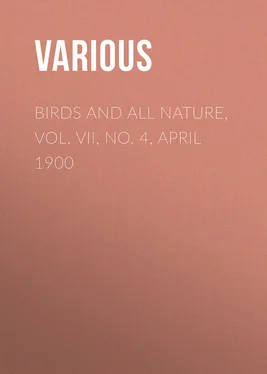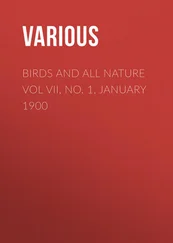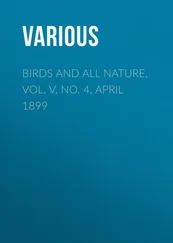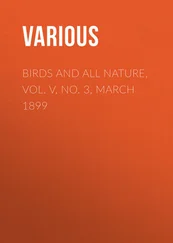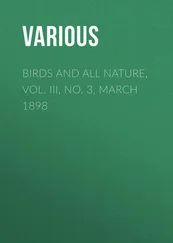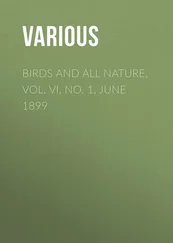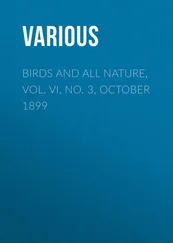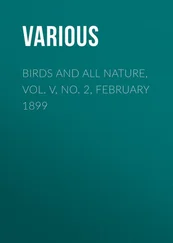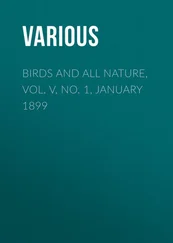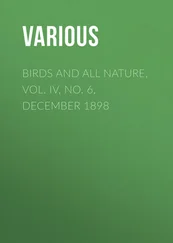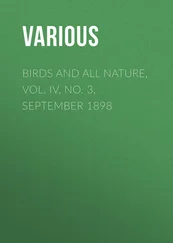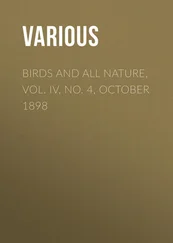Various - Birds and all Nature, Vol. VII, No. 4, April 1900
Здесь есть возможность читать онлайн «Various - Birds and all Nature, Vol. VII, No. 4, April 1900» — ознакомительный отрывок электронной книги совершенно бесплатно, а после прочтения отрывка купить полную версию. В некоторых случаях можно слушать аудио, скачать через торрент в формате fb2 и присутствует краткое содержание. Жанр: periodic, Биология, Природа и животные, foreign_edu, на английском языке. Описание произведения, (предисловие) а так же отзывы посетителей доступны на портале библиотеки ЛибКат.
- Название:Birds and all Nature, Vol. VII, No. 4, April 1900
- Автор:
- Жанр:
- Год:неизвестен
- ISBN:нет данных
- Рейтинг книги:5 / 5. Голосов: 1
-
Избранное:Добавить в избранное
- Отзывы:
-
Ваша оценка:
- 100
- 1
- 2
- 3
- 4
- 5
Birds and all Nature, Vol. VII, No. 4, April 1900: краткое содержание, описание и аннотация
Предлагаем к чтению аннотацию, описание, краткое содержание или предисловие (зависит от того, что написал сам автор книги «Birds and all Nature, Vol. VII, No. 4, April 1900»). Если вы не нашли необходимую информацию о книге — напишите в комментариях, мы постараемся отыскать её.
Birds and all Nature, Vol. VII, No. 4, April 1900 — читать онлайн ознакомительный отрывок
Ниже представлен текст книги, разбитый по страницам. Система сохранения места последней прочитанной страницы, позволяет с удобством читать онлайн бесплатно книгу «Birds and all Nature, Vol. VII, No. 4, April 1900», без необходимости каждый раз заново искать на чём Вы остановились. Поставьте закладку, и сможете в любой момент перейти на страницу, на которой закончили чтение.
Интервал:
Закладка:
Various
Birds and all Nature, Vol. VII, No. 4, April 1900
APRIL
These rugged, wintry days I scarce could bear,
Did I not know, that, in the early spring,
When wild March winds upon their errands sing,
Thou wouldst return, bursting on this still air
Like those same winds, when, startled from their lair,
They hunt up violets, and free swift brooks
From icy cares, even as thy clear looks
Bid my heart bloom, and sing, and break all care:
When drops with welcome rain the April day,
My flowers shall find their April in thine eyes,
Save there the rain in dreamy clouds doth stay,
As loath to fall out of those happy skies;
Yet sure, my love, thou art most like to May,
That comes with steady sun when April dies.
THE PROCESSION OF SPRING
A morning of radiant lids
O'er the dance of the earth opened wide;
The bees chose their flowers, the snub kids
Upon hind legs went sportive, or plied,
Nosing, hard at the dugs to be filled;
There was milk, honey, music to make;
Up their branches the little birds billed;
Chirrup, drone, bleat, and buzz ringed the lake.
O shining in sunlight, chief
After water and water's caress,
Was the young bronze orange leaf,
That clung to the trees as a tress,
Shooting lucid tendrils to wed
With the vine hook tree or pole,
Like Arachne launched out on her thread.
Then the maiden her dusky stole,
In the span of the black-starred zone,
Gathered up for her footing fleet.
As one that had toil of her own
She followed the lines of wheat
Tripping straight through the field, green blades,
To the groves of olive gray,
Downy gray, golden-tinged; and to glades
Where the pear blossom thickens the spray
In a night, like the snow-packed storm;
Pear, apple, almond, plum;
Not wintry now; pushing warm.
And she touched them with finger and thumb,
As the vine hook closes; she smiled,
Recounting again and again,
Corn, wine, fruit, oil! like a child,
With the meaning known to men.
THE AMERICAN BITTERN
THIS curious bird has several local names. It is called the "stake-driver," "booming bittern," and "thunder-pumper," in consequence of its peculiar cry. It was once thought that this noise was made by using a hollow reed, but the peculiar tone is possibly due to the odd shaped neck of the bird. Gibson says you hear of the stake-driver but can not find his "stake."
We have never seen a bittern except along water courses. He is a solitary bird. When alarmed by the approach of someone the bird sometimes escapes recognition by standing on its short tail motionless with its bill pointing skyward, in which position, aided by its dull coloring, it personates a small snag or stump or some other growth about it.
This bird has long legs, yellow green in color, which trail awkwardly behind it and serve as a sort of rudder when it flies. It has a long, crooked neck, and lengthy yellow bill edged with black. The body is variable as to size, but sometimes is said to measure thirty-four inches. The tail is short and rounded. In color this peculiar bird is yellowish brown mottled with various shades of brown above, and below buff, white and brown.
It is not a skillful architect, but places its rude nest on the ground, in which may be found three to five grayish brown eggs.
The habitat of the American bittern covers the whole of temperate and tropical North America, north to latitude about 60 degrees, south to Guatemala, Cuba, Jamaica and the Bermudas. It is occasionally found in Europe.
Frank Forrester included the bittern among the list of his game birds, and it is asked what higher authority we can have than his. The flesh is regarded as excellent food.
OUR LITTLE MARTYRS
Do we care, you and I,
For the song-birds winging by,
Ruffled throat and bosom's sheen,
Thrill of wing of gold or green,
Sapphire, crimson – gorgeous dye
Lost or found across the sky,
Midst the glory of the air;
Birds who tenderer colors wear?
What to us the free-bird's song,
Breath of passion, breath of wrong;
Wood-heart's orchestra, her life;
Breath of love and breath of strife;
Joy's fantasies; anguish breath;
Cries of doubt, and cries of death?
Shall we care when nesting-time
Brings no birds from any clime;
Not a voice or ruby wing,
Not a single nest to swing
Midst the reeds, or, higher up,
Like a dainty fairy-cup;
Not a single little friend,
All the way, as footsteps wend
Here and there through every clime,
Not a bird at any time?
Does it matter? Do we care
What the feathers women wear
Cost the world? Must all birds die?
May they never, never fly
Safely through their native air?
Slaughter meets them everywhere.
Scorned be the hands that touch such spoil!
Let women pity and recoil
From traffic barbarous and grave,
And quickly strive the birds to save.
LITTLE GUESTS IN FEATHERS
A BROOKLYN naturalist who gives much time to bird-study told me that as his rooms became overfull of birds he decided to thin them out before the approach of winter. Accordingly he selected two song sparrows and turned one of them adrift, thinking to let the other go the next morning.
The little captive was very happy for a few hours, flying about the "wild garden" in the rear of the house – a few square rods where more than 400 varieties of native plants were growing. It was not long, however, before a homesick longing replaced the new happiness and the bird returned to the cage which was left upon the piazza roof.
The next morning the second sparrow was given his freedom. Nothing was seen of him for a week, when he came to the window, beat his tired wings against the pane, and sank down upon the window sill so overjoyed at finding himself at home that he was fairly bursting with song. His throat trembled with the ecstasy; the feathers ruffling as the melody rose from his heart and deluged the air with sweetness. His joy was too complete for further experiment.
The first sparrow was again released only to return at nightfall and go promptly to bed at the general retiring hour.
This hour, by the way, varied indefinitely; the whole aviary accommodating their hours to those of their master, rising with him and settling for the night as he turned off the gas. After this same bird was repeatedly sent out, like Noah's dove, coming home at evening, till after many days it came no more – an implicit confidence in the rightness of all intention doubtless making it an easy prey to some evil design.
A handsome hermit thrush from the same aviary, domesticated in my room, after an hour or two "abroad" is as homesick for his cage as is a child for its mother.
When this bird came into my possession his open and discourteous disapproval of women was humiliating. His attitude was not simply endurance but open revolt, a deep-rooted hatred for the entire sex. When, after long weeks of acquaintance, this hostility was overcome he followed me about the room, stood beside me at my work, and has since been unchanging in a pathetic devotion.
He plants his tiny feet in my pen-tray and throws the pens upon the floor. He stands on tiptoe before the mirror, staring with curious eyes at the strange rival till awe is replaced by anger and the brown wings beat in unavailing effort to reach the insolent mimic. When shown a worm he trembles in excited anticipation, his little feet dancing upon the floor, his wings moving rapidly, while he utters a coaxing, entreating syllable. The song is sweetest when raindrops fall or when the room is noisy and confused. I notice, too, that he is more tuneful before a rain.
Читать дальшеИнтервал:
Закладка:
Похожие книги на «Birds and all Nature, Vol. VII, No. 4, April 1900»
Представляем Вашему вниманию похожие книги на «Birds and all Nature, Vol. VII, No. 4, April 1900» списком для выбора. Мы отобрали схожую по названию и смыслу литературу в надежде предоставить читателям больше вариантов отыскать новые, интересные, ещё непрочитанные произведения.
Обсуждение, отзывы о книге «Birds and all Nature, Vol. VII, No. 4, April 1900» и просто собственные мнения читателей. Оставьте ваши комментарии, напишите, что Вы думаете о произведении, его смысле или главных героях. Укажите что конкретно понравилось, а что нет, и почему Вы так считаете.
